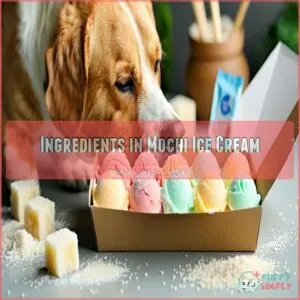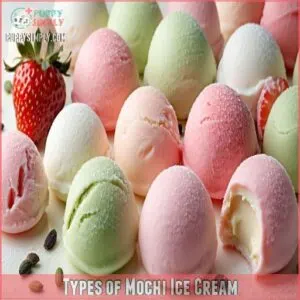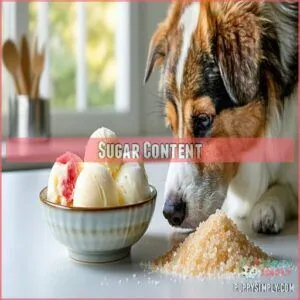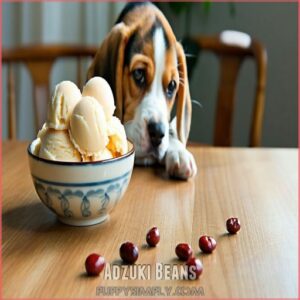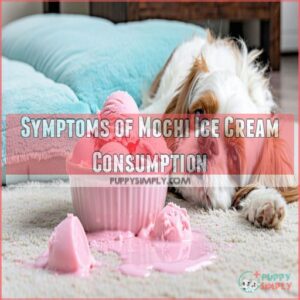This site is supported by our readers. We may earn a commission, at no cost to you, if you purchase through links.

The sugary, sticky rice dough is a notorious choking hazard, while the high sugar and fat content can upset their stomach or even cause pancreatitis over time.
Plus, many dogs are lactose intolerant, meaning the creamy ice cream could lead to, well, an explosive mess later.
Instead, stick to safer options like frozen banana slices or pet-safe yogurt. Your pup will appreciate it—trust us, they’re not missing out!
Table Of Contents
Key Takeaways
- Don’t share mochi ice cream with your dog—it’s a choking hazard and can upset their stomach due to the sticky rice, sugar, and lactose.
- Sticky, sugary treats like mochi ice cream can lead to severe issues such as pancreatitis, weight gain, and dental problems for your pup.
- Watch out for dangerous ingredients like xylitol, chocolate, or green tea, which can be toxic to dogs.
- Stick to dog-friendly alternatives like frozen bananas, plain yogurt, or specially formulated dog treats to keep them happy and healthy.
What is Mochi Ice Cream
Mochi ice cream is a Japanese-inspired frozen treat that wraps sweet, chewy rice dough around a scoop of ice cream.
This trendy dessert combines the best of both worlds — sticky rice cake and creamy ice cream.
However, it’s important to know what’s in it before sharing with your furry friend.
Ingredients in Mochi Ice Cream
Mochi ice cream ingredients sound simple, but they’re a mixed bag for dogs. You’ve got: rice flour types, sweetener types, thickening agents, flavoring agents, and coloring additives.
- Rice flour types: Glutinous rice flour gives it chewiness but lacks nutrients for dogs.
- Sweetener types: Sugar overload can trigger health issues.
- Thickening agents: Harmless for humans, not ideal for dogs.
- Flavoring agents: Some, like chocolate, are toxic.
- Coloring additives: Unsafe ones might lurk.
Always check for xylitol-free mochi!
History of Mochi Ice Cream
Born from the rich tapestry of Japanese traditions, mochi ice cream blends cultural significance and modern creativity. Its roots trace back to traditional Japanese desserts, evolving from simple glutinous rice cakes. Early variations included sweet fillings like red bean paste.
Understanding the canine health risks associated with mochi is important for pet owners who want to share this treat with their dogs.
By the 1980s, production evolution transformed mochi into a global sensation, with modern adaptations introducing vibrant flavors loved worldwide.
Types of Mochi Ice Cream
You’ll find mochi ice cream in countless flavor variations that span both traditional and modern tastes.
Popular variations include:
- Matcha green tea with white chocolate for a balanced sweetness
- Black sesame paired with vanilla, perfect for dietary restrictions
- Classic red bean (azuki) that highlights its cultural significance
The preparation methods differ across Japan, creating unique texture profiles that range from pillowy soft to delightfully chewy.
Can Dogs Eat Mochi Ice Cream
Your dog’s expectant eyes might tempt you to share that colorful mochi ice cream, but veterinary advice strongly warns against it. Despite its appealing taste, mochi ice cream poses several health impacts that could harm your furry friend.
The potential toxicity varies depending on ingredients, but even standard varieties aren’t dog-safe alternatives. The sticky texture creates a serious choking hazard, while the high sugar content can trigger severe gastrointestinal issues.
For more information on dog food safety, understanding the risks associated with mochi ingredients is key. Though it’s not as dangerous as treats containing xylitol, mochi ice cream dangers include possible pancreatitis and irregular heartbeat, especially in varieties containing green tea powder.
If your dog ate mochi ice cream, monitor them closely for unusual behavior and contact your vet immediately if symptoms occur.
Mochi Ice Cream Ingredients
Before you share that tempting mochi ice cream with your furry friend, you’ll want to know what’s inside this trendy Japanese treat.
The main ingredients include glutinous rice flour, sugar, and milk or coconut milk, which might sound simple but can affect your dog’s health in ways you wouldn’t expect.
Glutinous Rice Flour
While investigating mochi ice cream’s safety for dogs, let’s look at its main ingredient: glutinous rice flour.
This sticky rice flour creates that signature chewy texture we love, but it’s not the best for canine digestion.
The sticky texture can be challenging for dogs to process, and while it’s not toxic, it offers minimal nutritional value. Think of it as empty calories that don’t benefit your pup’s health.
Sugar Content
The sugar content in mochi ice cream poses serious concerns for your dog’s health. Added sugars and sweeteners in both the rice flour coating and ice cream filling can spike your pup’s glycemic index dangerously high. Dogs process glucose differently than humans, making these high sugar levels particularly risky.
Understanding canine health risks is important to recognizing the potential harm that mochi ice cream can cause.
The fructose dangers extend beyond immediate sugar rushes – they can lead to long-term health issues that no treat is worth risking.
Milk and Coconut Milk
Mochi ice cream’s dairy components pose unique challenges for your furry friend’s lactose digestion. Most dogs struggle with dairy products, making traditional milk-based versions a risky choice.
Here’s what you should know about milk in mochi:
- Dogs lack sufficient lactase enzymes
- Coconut milk alternatives aren’t necessarily safer
- Dairy can trigger stomach upset
- Milk nutrients aren’t worth the risk
- Canine milk consumption should be minimal
Consider skipping mochi ice cream entirely to keep your pup safe and comfortable.
Adzuki Beans
Many mochi ice cream varieties contain adzuki beans in addition to milk ingredients.
These sweet red beans contain oxalates that can be harmful to dogs. Bean toxicity is a real concern regarding canine consumption.
Skip the adzuki-filled mochi and opt for safe alternatives for your dog’s digestive health.
Risks of Mochi Ice Cream for Dogs
You’ll want to think twice before sharing your mochi ice cream with your furry friend, as this trendy dessert can cause serious health issues like pancreatitis and digestive problems in dogs.
The combination of high sugar content and lactose can make your pup sick, leading to symptoms like vomiting, diarrhea, and unwanted weight gain.
High Sugar Content
The sugar content effects of mochi ice cream can wreak havoc on your dog’s health. Even a small portion packs more sugar than your furry friend should have in a day.
Regarding canine sugar intake, here’s what you need to watch for:
- Rapid weight gain from empty calories
- Dental problems like cavities and gum disease
- Blood sugar spikes that can stress their system
It is important to understand dog sugar intake to prevent health issues. Instead of sugary treats, opt for dog-safe alternatives that’ll keep their tail wagging without the risks.
Lactose Intolerance
Like many humans, your furry friend might struggle with dairy digestion regarding mochi ice cream.
Dogs typically lack sufficient lactase enzymes to properly break down milk and ice cream, leading to lactose intolerance symptoms.
Even small amounts can trigger discomfort, so it’s best to skip sharing this treat. If you’re unsure about your dog’s tolerance to dairy, consult your vet first.
Gastrointestinal Problems
When your dog eats mochi ice cream, their digestive system faces multiple challenges. The sticky rice flour and dairy components can trigger severe digestion issues, while the dense texture often leads to diarrhea.
You’ll likely notice signs of an upset stomach within 30 minutes, including bloating and vomiting.
If your pup shows any gastrointestinal problems after sneaking a bite, keep a close eye on their behavior.
Pancreatitis
Beyond stomach troubles, mochi ice cream’s high fat and sugar content can trigger pancreatic inflammation in your furry friend. This dangerous condition, known as pancreatitis, requires immediate veterinary care and can become chronic if left untreated.
Watch for these warning signs of acute pancreatitis:
- Your pup’s belly becomes tender to touch
- Repeated vomiting or diarrhea that won’t stop
- Loss of appetite and unusual lethargy
- Hunched posture from abdominal pain
Alternatives to Mochi Ice Cream
If you’re looking to treat your furry friend without the risks of mochi ice cream, you’ll find plenty of safe and tasty options that your dog will love.
You can offer fresh fruits like apple slices or banana chunks, crunchy vegetables like carrots, or specially made dog treats that won’t upset their stomach.
Fruits and Vegetables
Instead of risky mochi ice cream, try safe fruit options like frozen berries or seedless watermelon chunks for your pup. These healthy dog treats deliver natural sweetness without added sugars.
You can also offer vegetable snacks like carrots and green beans, which provide essential nutrients while satisfying their sweet tooth.
For a variety of healthy dog treats, consider exploring different types of fruits. Fresh fruits and veggies make perfectly balanced dog diets when served in moderation as safer treats.
Fortified Biscuits
Regarding nutritional benefits, fortified biscuits from trusted pet stores offer a safer alternative to mochi ice cream for your furry friend. Many pet owners rely on fortified dog biscuits as a healthy option for their pets. These specially formulated dog treats pack essential nutrients while satisfying their snacking urges.
Here’s what to look for in quality fortified biscuits:
- Natural ingredients with clear nutritional labels
- Added vitamins and minerals for digestive health
- Appropriate size for your dog’s breed
- No artificial preservatives or excessive sugars
Homemade Treats
Making healthy treats at home lets you control exactly what goes into your pup’s snacks, beyond store-bought options. You’ll find simple, safe treat recipes using ingredients like frozen bananas, pure pumpkin puree, and plain yogurt.
For more information on homemade dog snacks, consider exploring various recipes online.
Try whipping up homemade dog mochi alternatives by freezing bone broth into cubes or creating vet-approved peanut butter drops. Just remember to stick to portion control guidelines and store treats properly.
Symptoms of Mochi Ice Cream Consumption
If you’ve caught your furry friend sneaking a bite of mochi ice cream, you’ll want to watch for signs like vomiting, diarrhea, and unusual lethargy.
Your pup might also be drinking more water than usual, which can signal their body’s response to the high sugar content in this sweet treat.
Gastrointestinal Upset
Your dog’s stomach might rebel after eating mochi ice cream, leading to uncomfortable gastrointestinal upset. Watch for these warning signs of digestive issues:
- Sudden bouts of diarrhea within 2-4 hours
- Persistent vomiting that doesn’t resolve
- Visible bloating or a tight, hard belly
- Whining or pacing due to stomach pain
- Excessive drooling and lip-licking
Understanding lactose intolerance is important in determining why such reactions occur in dogs.
Don’t wait if these symptoms appear – contact your vet right away for immediate assistance.
Weight Gain
Regular mochi ice cream consumption can throw your dog’s calorie intake into chaos. Just a few bites pack enough sugar and fat content to trigger serious metabolic changes, leading straight to obesity.
While portion control might seem like a solution, there’s no such thing as mochi ice cream safe for dogs – the calories are simply too concentrated.
Plus, the extra weight can offset their usual exercise impact.
Dental Issues
Beyond weight concerns, sugar-related decay from mochi ice cream poses serious oral health risks for your pup.
Dogs who snack on these sweet treats often develop tartar buildup and painful gum inflammation. The sticky texture can lodge between teeth, leading to cavities and persistent dental problems.
You’ll want to stick to dog-approved treats – your furry friend’s pearly whites will thank you later.
Inflammation
Consuming mochi ice cream can trigger inflammatory responses in your dog’s body, leading to several concerning conditions. For example, the high-fat content can cause pancreatitis.
Dermatitis concerns, such as skin irritation, might also appear. Joint inflammation and potential arthritis development are also risks, especially in older dogs.
Watch for signs of discomfort or reduced mobility after your pup sneaks a taste.
What to Do if Dog Eats Mochi Ice Cream
If you’ve caught your furry friend sneaking a bite of mochi ice cream, don’t panic – while it’s not ideal, knowing what to do next can make all the difference.
You’ll need to watch for signs of upset stomach and contact your vet if you notice any concerning symptoms, especially if your dog has eaten mochi containing ingredients like green tea powder or red bean paste.
Monitoring Behavior
If your dog ate mochi ice cream, keep an eye out for digestion changes like diarrhea or vomiting. Watch energy levels—restlessness or lethargy can signal trouble.
Stool consistency might shift; skin irritation or panting could appear too.
Breathing difficulties, hyperactivity, or tremors demand quick attention.
It’s also important to remember the daily calorie intake when introducing new foods to prevent obesity and other health issues.
Spotting these signs early keeps your pup safe and feeling their best.
Consulting a Veterinarian
Noticing unusual symptoms? Don’t wait. Call your vet for specific advice.
Share the ingredient list—details like chocolate or green tea powder matter. Online vet services can also guide you if time’s tight.
Even mild signs like diarrhea or cramping warrant veterinary care. Always prioritize trusted veterinary services for post-consumption advice and precautionary measures to safeguard your pup’s health.
Immediate Action
Grab any leftover mochi ice cream before your dog gets a second helping.
Encourage them to drink water, but skip inducing vomiting—it could backfire due to mochi’s sticky texture.
Monitor behavior closely for symptoms like vomiting or bloating.
Call for emergency veterinary care if signs of mochi ice cream toxicity appear, especially with xylitol or risky ingredients.
Preventing Future Incidents
Keep your pup safe by staying ahead of future snack surprises. Pet safety starts with awareness!
- Safe storage: Seal mochi or similar desserts in secure containers out of reach.
- Training alternatives: Teach commands like "leave it" to prevent stolen bites.
- Dog-friendly options: Explore dog-proof treats or xylitol-free mochi dogs for guilt-free shared moments.
Frequently Asked Questions (FAQs)
Are there any alternatives to mochi ice cream for dogs?
When dessert cravings call for your furry friend, opt for safe options like frozen banana slices, plain yogurt, or dog-friendly ice cream.
These healthier treats offer a sweet moment without the risks of mochi.
Does mochi ice cream need to be refrigerated?
Mochi ice cream absolutely needs to be refrigerated to keep its ice cream center from melting and the mochi shell fresh.
Left out too long, it turns into a sticky mess nobody wants to deal with.
How does mochi ice cream affect puppies?
Puppies’ sensitive stomachs can react harshly to mochi ice cream.
The sugar, lactose, and sticky rice can cause tummy troubles like bloating, diarrhea, or vomiting.
Stick to puppy-safe treats to avoid unnecessary vet visits.
Are artificial sweeteners in mochi harmful to dogs?
Artificial sweeteners, like xylitol often found in some treats, are extremely toxic to dogs.
These sweeteners can cause severe health issues, even in small amounts.
Always double-check ingredients and avoid giving anything unsure to your pup.
How much mochi is dangerous for dogs?
Even a small piece of mochi can be risky for dogs.
Its sticky texture can cause choking or digestive blockage.
The sugar content can lead to immediate stomach upset or long-term health issues.
Does mochi ice cream cause allergies in dogs?
Allergies in dogs are like a wildcard. For example, mochi ice cream could trigger reactions if it contains milk, sugar, or additives.
Watch for itching, swelling, or digestive issues.
Contact your vet if symptoms show up.
Conclusion
Sharing mochi ice cream with your dog might seem harmless, but it’s a recipe for trouble, like letting them sneak off with your flip-flop.
The sticky rice, high sugar, and dairy can lead to choking, upset stomachs, or even serious issues like pancreatitis.
Dogs can’t digest these ingredients well, and it’s not worth the risk. Stick to safer treats instead. Trust us, your pup isn’t missing out, and their health will thank you for it.
- https://www.petmd.com/dog/emergency/poisoning-toxicity/caffeine-and-pets-safety-tips-and-considerations
- https://pangovet.com/?utm_source=dogster&utm_medium=article&utm_campaign=dog_eat_drink
- https://petkeen.com/how-to-stop-dog-from-begging-for-food/
- https://vcahospitals.com/know-your-pet/caffeine-toxicity-in-pets
- https://en.wikipedia.org/wiki/Mochi_ice_cream

